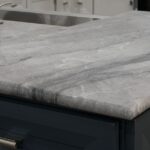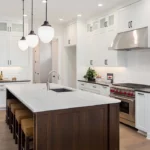You may have heard of natural stones before; be it a gorgeous granite wall backsplash, a neat quartzite vanity, or a classic marble entrance archway, natural stones have been the centerpiece of modern home design for years. And for good reasons – on the market, we can find a plethora of beautiful options to choose from, with a wide catalog that can satisfy anyone’s preferences and aesthetic goals. However, a peculiar addition has found its way into many people’s homes – surpassing the popularity of even the most traditional stones. These are porcelain countertops.
In this article, find out all the details behind porcelain countertops – including the factors they bring to the table in comparison to their counterparts, how to use them properly in a designated space, and even some design ideas to inspire you.
Read as well: 8 Benefits of Honed Quartzite Countertops and Their Applications
What are porcelain countertops?
Porcelain is a vitrified pottery material that dates back to the Shang Dynasty in China. Depending on its manufacturing process and chemical additions, the material can appear opaque or somewhat translucent, creating a good framework for several combinations and design possibilities.
But that’s the catch: as opposed to traditional natural stones such as marble and granite, which are collected in quarries around the world, porcelain is a manmade product that is molded to fit its designated purpose. In the case of home design, a porcelain slab is made by heating a mix of powdered china stone and white china clay, also known as kaolin, at about 1450°C. This high temperature causes the stone to vitrify into a dense, highly durable material – and though impurities such as silica, mineral oxides, and feldspars exist in the clay, they add to its strength and visual appeal rather than harming its structural quality.
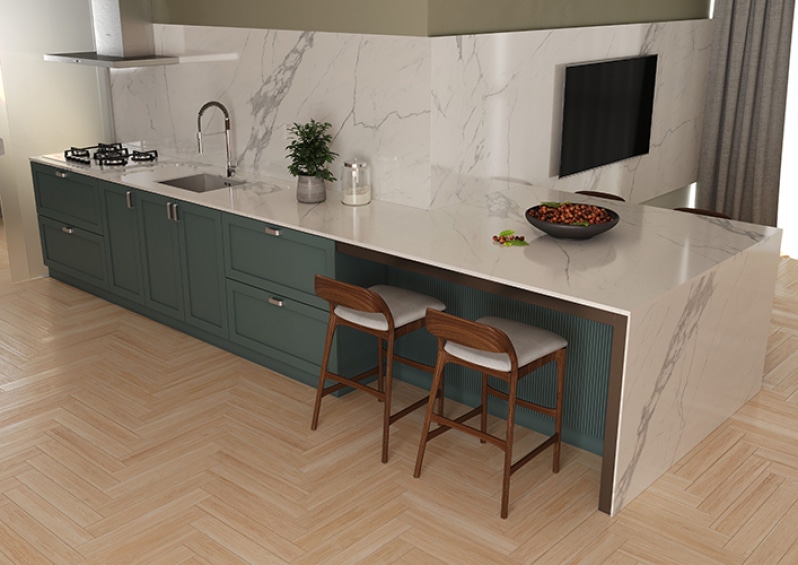
Recently, porcelain countertops have been gaining popularity in kitchen and bathroom design due to their durability, versatility, and aesthetics, serving as a valuable addition to residential and commercial spaces alike. Just like marble – which actually shares a slight resemblance with some types of porcelain – these countertops can be purchased, transported to any space, and professionally installed without fuss.
Under the due care (more on that in a bit), porcelain countertops can last for years to come.
Don’t miss: Pros and Cons of Quartzite Countertops
6 pros of porcelain countertops
Porcelain can be an incredible countertop choice for homeowners. As we’ll see, not only is it non-porous – which makes it highly stain-resistant – but it also comes in a wide pool of patterns and textures. Moreover, it can also be cut into just about any size, shape, or thickness that you need without breaking the bank.
As professional stonemasons, we welcome the consistency behind this affordable material. The final product is nearly impervious to heat, stains, scratches, and even UV rays, with many slabs featuring glazes that showcase a matte or glossy finish.
Check out the main pros of porcelain countertops below:
- High durability against chemical components and physical impact
- Non-porosity (no need to seal)
- Variety of designs
- Thickness options
- Easy maintenance
- Increase in home resale value
High durability
Porcelain countertops are highly durable surfaces due to their exceptional hardness, heat resistance, stain resistance, chemical resistance, impact resistance, frost resistance, and UV stability. Their hard surface makes them resistant to scratches and abrasions, while their heat resistance allows them to withstand high temperatures without damage. Additionally, their non-porous nature prevents stains from liquids and makes them easy to clean. They are also resistant to chemicals, impacts, frost, and UV rays, ensuring their longevity and suitability for various indoor and outdoor applications. Overall, porcelain countertops offer a reliable and low-maintenance option for kitchen, bathroom, and outdoor surfaces.
Non-porosity
Porcelain countertops are non-porous, meaning they have a very low absorption rate and do not allow liquids or gasses to penetrate their surface. This characteristic makes them highly resistant to staining, as liquids cannot seep into the material and cause discoloration or damage. But the best part comes now: unlike natural stone countertops such as granite or quartzite, which require periodic sealing to maintain their integrity over time, porcelain countertops do not need sealing. The non-porous nature of porcelain eliminates the need for sealing, saving homeowners time, budget, and effort in maintenance. Additionally, the absence of pores makes porcelain countertops more hygienic – as bacteria and mold have fewer places to harbor and grow, resulting in a cleaner and healthier surface.
Variety of designs
Porcelain countertops offer a wide variety of designs to suit different aesthetic preferences and interior styles. Manufacturers employ advanced printing and glazing techniques to create an extensive range of colors, patterns, and finishes, allowing homeowners to achieve their desired look and match the ambiance as a whole. Furthermore, porcelain countertops can mimic the appearance of marble, granite, limestone, or slate, with remarkable accuracy.
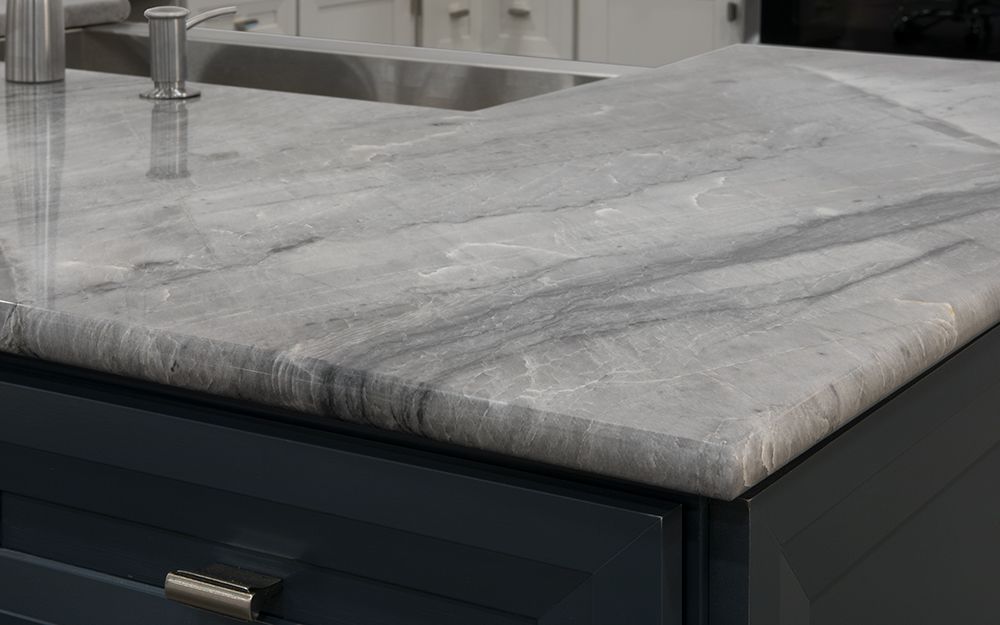
Thickness options
They are available in a variety of thickness options to suit different design preferences and technical requirements.
Thin slabs, typically around 6mm to 12mm thick, are lightweight and versatile, suitable for wall cladding or furniture surfaces. Standard thickness slabs, around 12mm to 20mm thick, offer a balance of durability and manageability, making them suitable for most countertop applications. Thick slabs, around 20mm to 30mm thick or more, provide enhanced durability and a luxurious appearance, ideal for high-traffic areas or applications where a thicker profile is desired.
The choice ultimately depends on factors such as the intended application, design preferences, and installation considerations – and it’s always essential to consult with professionals to determine the most suitable option for your project.
Easy maintenance
Maintaining porcelain countertops is relatively easy due to their non-porous nature. Adopting some simple daily practices can help keep your countertops looking clean and healthy, such as:
- Wipe down the countertops with a soft cloth and mild soapy water regularly to remove any surface dirt, spills, or food residues;
- Avoid using abrasive cleaners or scouring pads, as they may scratch the surface;
- Promptly clean up spills to prevent them from staining the surface – acidic substances like vinegar or lemon juice should be wiped up quickly to prevent potential etching;
- Stick to gentle, non-abrasive cleaning products recommended for use on porcelain surfaces;
- To prevent scratching or chipping, always use cutting boards when chopping or slicing food, and use trivets or hot pads to protect the surface from hot pots, pans, or appliances;
- Avoid dropping heavy objects onto the surface, and use caution when handling sharp or heavy items near the countertop edges.
Increase in home resale value
These countertops have the potential to increase the resale value of a home due to their durability, attractive appearance, and low maintenance requirements. High-quality porcelain countertops with appealing designs and finishes can enhance the overall aesthetic of a kitchen or bathroom – thus making the home more attractive to potential buyers. Additionally, the long-term durability and practicality of porcelain countertops may be seen as a valuable investment, adding to the home’s appeal and first impressions.
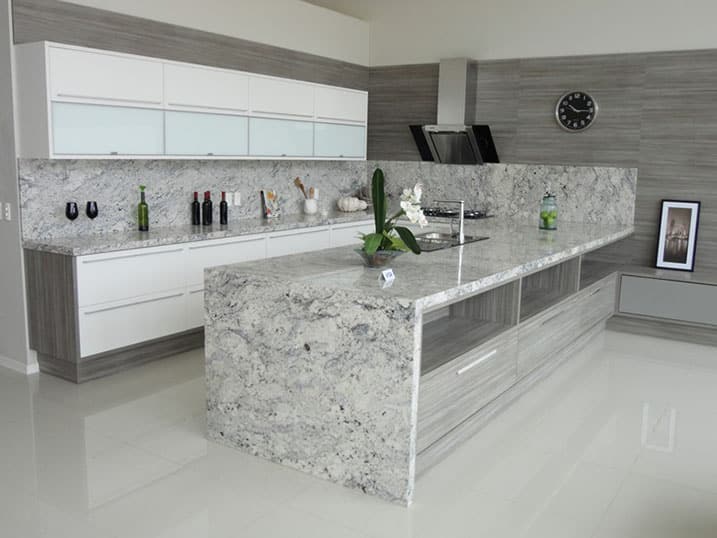
3 cons of porcelain countertops
That said, there are three main cons when it comes to porcelain countertops: the higher cost, the lack of custom edges, and the poorer color selection when compared to natural stones. Despite these factors, many homeowners find that the benefits of these slabs far outweigh their drawbacks – but it’s important to be aware of them either way.
Higher cost
Porcelain countertops usually come at a higher price point compared to some other products, but that can be influenced by factors – such as the quality of the material, the manufacturing process, the brand, and the thickness of the slabs. Unfortunately, the countertop fabrication process is trickier when you’re working with high-density materials – but finding the right fabricator for full-sized slabs is just as difficult when it comes to porcelain, given how fragile its thin state is. But know this: depending on the design requirements, it’s possible to buy porcelain slabs at a cheaper price than granite, marble, and even quartz, another manmade stone. You can expect to pay around $60 to $150 per square foot, including materials and installation.
Lack of custom edges
Another downside of porcelain slabs is that they simply can’t accommodate beveled, rounded, or elaborate edgework like natural stones (and even concrete) can. The edges most often seen on porcelain countertops are eased (square), apron (2-3 inches thick), or mitered (also known as waterfall), all of which can support their weight without breaking. So if you’re looking for particular types of countertop edges like bullnose, ogee, or chiseled, then choosing marble or quartzite might be your best course of action.
Color selection
While porcelain countertops offer a wide range of design options, including patterns and finishes that mimic natural stone, some homeowners may find the color selection to be more limited compared to natural stone varieties like granite or marble. Natural stones often exhibit unique variations and veining patterns, resulting in a broader spectrum of hues – but of course, to each their own.
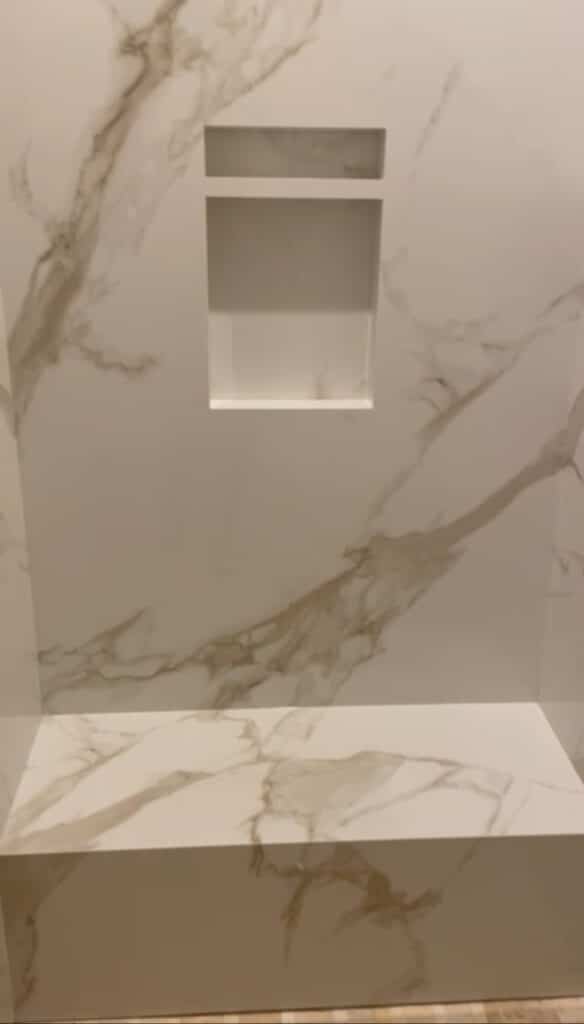
Don’t miss: All About Seams in Quartzite Countertops
Contact Eagle Stones today for supply and installation services!
Ready to make the best choice of your life? Then get in touch with our agents to begin planning your next interior renovation – and have porcelain countertops as the main character.
We can guide you through every step not only of your choice but of the installation process as well; our professionals have been serving the city of Sarasota and all surrounding counties for over a decade! Make sure to visit our showroom to see firsthand how porcelain countertops will look in your ambiance.
We’ll be waiting for you!
QUICK NOTE: Did you know that porcelain can also be used as a paving stone for gorgeous outdoors? Eagle Pavers, our branch company, offers a huge catalog of top-quality porcelain pavers to embellish your home alongside your new countertops. Click here to check us out!

